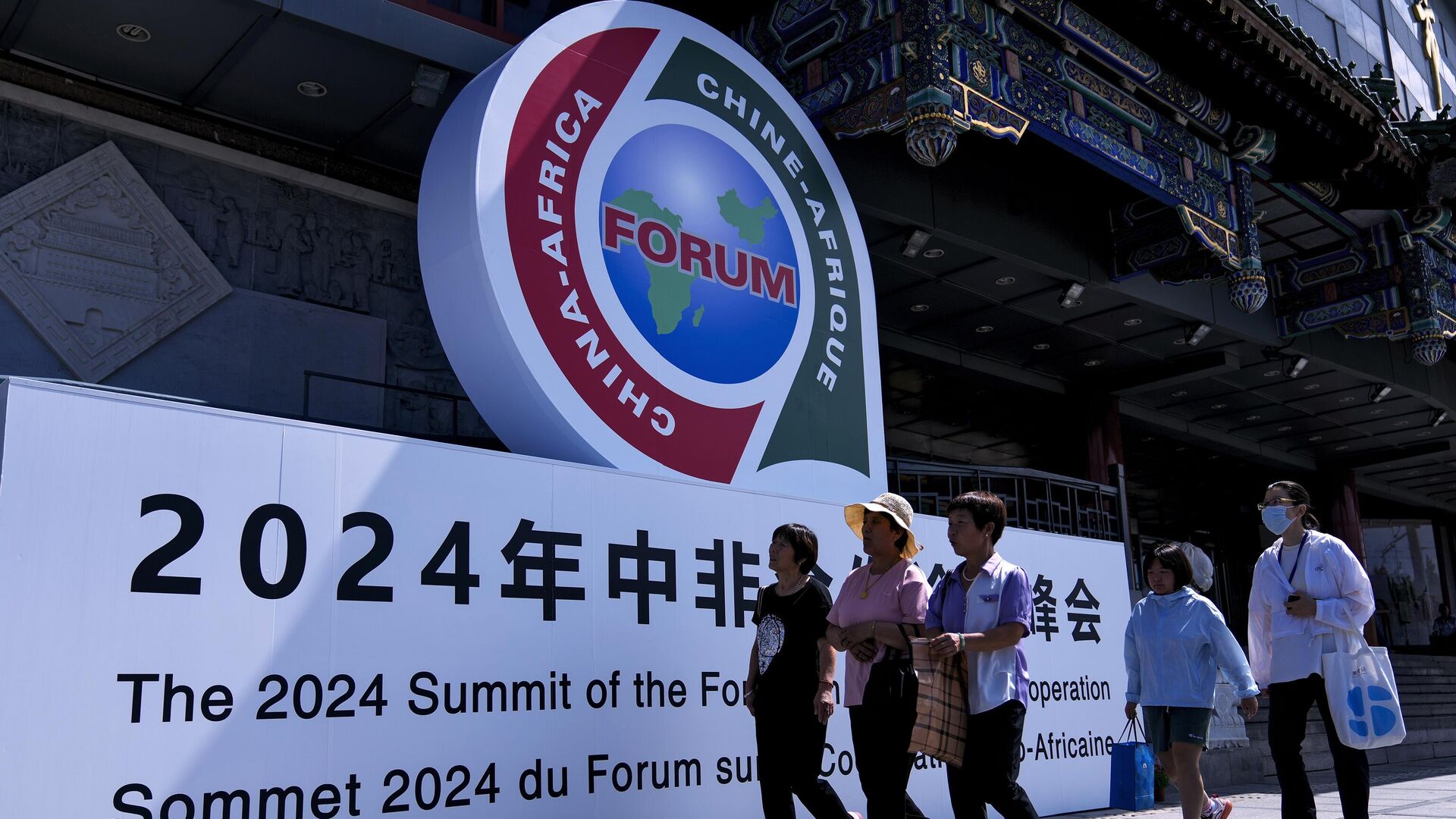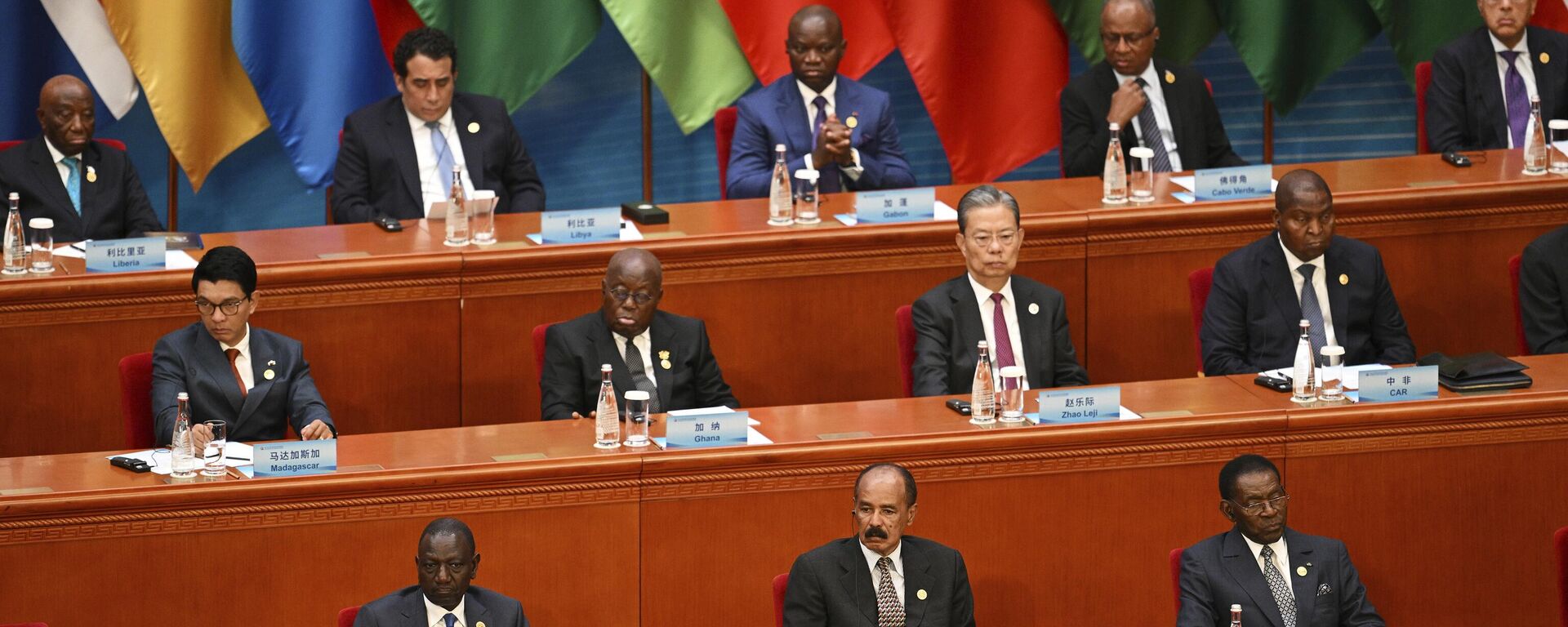https://sputnikglobe.com/20240914/china-africa-forum-africa-is-not-alone-anymore-1120143381.html
China-Africa Forum: 'Africa is Not Alone Anymore'
China-Africa Forum: 'Africa is Not Alone Anymore'
Sputnik International
The ninth Forum on China-Africa Cooperation (FOCAC) in Beijing highlighted China’s continued efforts to partner up with the continent, Chatham House reported.
2024-09-14T05:44+0000
2024-09-14T05:44+0000
2024-09-14T05:44+0000
analysis
vladimir putin
china
burkina faso
focac
africa insight
east africa
central africa
north africa
sub-saharan africa
https://cdn1.img.sputnikglobe.com/img/07e8/09/0e/1120145007_0:37:3072:1765_1920x0_80_0_0_5682d12b1446a1d09ee5db99bf677ad7.jpg
The ninth Forum on China-Africa Cooperation (FOCAC) in Beijing highlighted China’s continued efforts to partner up with the continent, Chatham House reported. Fifty-one African heads of state were present for the summit on September 6, which Chatham noted was “many more than are scheduled to speak at the UN General Assembly this month”.Koffi Kouakou, an African analyst and research fellow at the Center for African China Studies at the University of Johannesburg, joined Sputnik’s Fault Lines to discuss the growing partnership between China and the second-largest continent in the world. Kouakou noted that Africa is “mattering” due to the overwhelming interest that foreign countries - especially countries in the West - have shown the oftentimes overlooked continent.Stopping short of offering broad-based debt relief at the Summit, China instead pledged $50.7 billion in credit lines and funding for the next three years, with an emphasis on trade and investment partnerships. Chatham noted that China’s reluctance to offer the continent debt cancellation most likely reflects domestic financial constraints and “global economic uncertainty”. However, the article notes that this could be a more sustainable as well as mutually beneficial strategy.Prof. Alexis Habiyaremye from the University of Johannesburg spoke to Sputnik about the summit, and suggested that China has become the major, if not the main, trading partner for the majority of African countries thanks to the “actual win-win outcomes of the Sino-African trade as opposed to exploitative trade with Western trade partners that established monopolies over natural resources in secret military cooperation arrangements with former colonial powers.”The professor then suggested that trade between African countries and the West “is usually structured as extractive monopolies intended to keep Africa down and unable to produce anything else than raw materials for Western corporations.” And added that China can also offer more “affordable products” with a higher “value-for-money ratio.”“...it also plays into the geopolitical logic that Mali, Burkina Faso, and Niger are not alone anymore. And, President Putin of Russia has made it clear, anybody who touches these three countries will touch him.”
https://sputnikglobe.com/20240907/china-africa-trade-yields-win-win-outcomes-while-west-only-seeks-to-exploit-continent-1120069571.html
china
burkina faso
east africa
central africa
north africa
sub-saharan africa
south africa
west africa
Sputnik International
feedback@sputniknews.com
+74956456601
MIA „Rossiya Segodnya“
2024
Mary Manley
https://cdn1.img.sputnikglobe.com/img/07e6/01/0b/1092187887_0:0:2048:2049_100x100_80_0_0_0c2cc4c84f89aff034cc55bb01fb6697.jpg
Mary Manley
https://cdn1.img.sputnikglobe.com/img/07e6/01/0b/1092187887_0:0:2048:2049_100x100_80_0_0_0c2cc4c84f89aff034cc55bb01fb6697.jpg
News
en_EN
Sputnik International
feedback@sputniknews.com
+74956456601
MIA „Rossiya Segodnya“
Sputnik International
feedback@sputniknews.com
+74956456601
MIA „Rossiya Segodnya“
Mary Manley
https://cdn1.img.sputnikglobe.com/img/07e6/01/0b/1092187887_0:0:2048:2049_100x100_80_0_0_0c2cc4c84f89aff034cc55bb01fb6697.jpg
focac, china-africa, multipolar world, brics, china-africa cooperation, china-africa partnership, russia-africa cooperation, russia-africa forum, china-africa forum, dedollarization, china-africa trade, china-africa project
focac, china-africa, multipolar world, brics, china-africa cooperation, china-africa partnership, russia-africa cooperation, russia-africa forum, china-africa forum, dedollarization, china-africa trade, china-africa project
China-Africa Forum: 'Africa is Not Alone Anymore'
Chinese media branded the summit as the “biggest diplomatic event” organized by Beijing in recent years, as the country has become the largest bilateral trading partner of sub-Saharan Africa, with the total trade volume having reached $282 billion in 2023.
The ninth Forum on China-Africa Cooperation (FOCAC) in Beijing highlighted China’s continued efforts to partner up with the continent, Chatham House reported. Fifty-one African heads of state were present for the summit on September 6, which Chatham noted was “many more than are scheduled to speak at the UN General Assembly this month”.
Koffi Kouakou, an African analyst and research fellow at the Center for African China Studies at the University of Johannesburg, joined
Sputnik’s Fault Lines to discuss the growing partnership between China and the second-largest continent in the world. Kouakou noted that Africa is “mattering” due to the overwhelming interest that foreign countries - especially countries in the West - have shown the oftentimes overlooked continent.
“[It was a] very successful gathering in Beijing last week, and I think the 50 billion US dollars is for the next three years. Some people are saying, wait a minute, it's not enough, but it is a substantial amount of resources that China has opened,” the analyst said. “And one key issue that the Chinese have made clear, and of course energy is one, but development and energy are very close to each other, is what they call the Global South Modernization Project.”
Stopping short of offering broad-based debt relief at the Summit, China instead pledged $50.7 billion in credit lines and funding for the next three years, with an emphasis on trade and investment partnerships. Chatham noted that China’s reluctance to offer the continent debt cancellation most likely reflects domestic financial constraints and “global economic uncertainty”. However, the article notes that this could be a more sustainable as well as mutually beneficial strategy. "And, it's a big issue now, and, as you know, China's been on this modernization. And, for them, and for the Global South, modernization doesn't mean Westernization. It's a very important element because what the result of Western modernization has done to the rest of the world is get a lot of these countries very poor, struggling. They can't get development going," Kouakou explained. "They really want an alternative to the progress that they wanna see, and mainly China is leading it, and that's what made this FOCAC."
"China's strategy has two big levels. The first one is at continental level. So this is what FOCAC is all about. But the Chinese are smart. They know that they can't do it only big at their continental level. They also have to deal with what's called bilateral levels. So they talk to each other's countries," he added.
Prof. Alexis Habiyaremye from the University of Johannesburg spoke to Sputnik about the summit, and suggested that China has become the major, if not the main, trading partner for the majority of African countries thanks to the “actual win-win outcomes of the Sino-African trade as opposed to exploitative trade with Western trade partners that established monopolies over natural resources in secret military cooperation arrangements with former colonial powers.”
The professor then suggested that trade between African countries and the West “is usually structured as extractive monopolies intended to keep Africa down and unable to produce anything else than raw materials for Western corporations.” And added that China can also offer more “affordable products” with a higher “value-for-money ratio.”
“...one of the most important events that took place the past couple of months is that the three now have consolidated the alliance of this region between Mali, Burkina Faso, and Niger across the board. They're looking at development issues, energy sovereignty. And, as you know, Mali and especially Burkina Faso are now, they've received the help of Russia to build nuclear power plants there for them for energy,” he added.
“...it also plays into the geopolitical logic that Mali, Burkina Faso, and Niger are not alone anymore. And, President Putin of Russia has made it clear, anybody who touches these three countries will touch him.”






